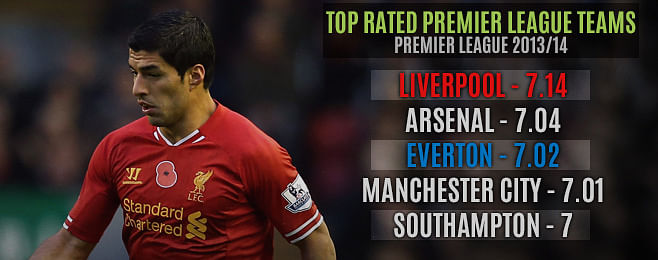
Team Focus: The evolution of Liverpool ahead of the Merseyside derby

Team Focus: The Evolution of Liverpool Ahead of Merseyside Derby
Brendan Rodgers, the theory went, was the king of possession, a manager who prioritised having the ball almost above all else. There was even talk at times last season that he cared more about possession than goals, and that his side was great at moving the ball sideways but not so good at putting it in the net, all foreplay and no penetration.
Yet this season, Liverpool are the division’s third-highest scorers (21 goals), and they go into Saturday’s derby away to Everton with lower possession stats than their Merseyside rivals.
Last season, Liverpool had the third highest percentage of possession in the division – 57.2%; this season they are down to ninth with 53.8%, while Everton are fourth in the table with 58.1%. After two successive goalless draws, it is perhaps they who have become the team that lacks the edge to turn possession into goals.
For Liverpool, the fall in percentage of possession is the result of a change of approach, something seen in the fact that pass-success rate is actually marginally up on last year’s at 84.6% as opposed to 84.3% (Everton complete 83.8% of their passes).
It’s not that they’re misplacing passes; rather they’re just not playing as many as last season, and that’s to do with the excellence of their forward pairing of Luis Suarez and Daniel Sturridge; their game is based less now on control, than on trying to get the ball forward to the front two.

Playing a pairing in itself poses opponents problems they have almost forgotten how to solve in an age in which lone strikers predominate. Both Suarez and Sturridge are adept at ghosting behind the defensive line, looking for through balls, of which Liverpool play a league-high five per game.
Everton, by contrast, play far more to the strength of ?Romelu Lukaku and so play only one through-ball per game. That perhaps means Everton having to play a little deeper than they usually would, looking to cut down the space for Suarez and Sturridge to dart into.
It says much for Liverpool’s approach, looking to play the ball forward quickly on the ground, that they have won fewer aerial duels this season (13.7 per game) than any other Premier League team.
The danger of a partnership as devastating as that of Suarez and Sturridge is that a team can become over-reliant on it, and when Liverpool were outclassed by Arsenal, there was a sense that if the supply to the two can be cut off, Liverpool can be neutered.
That’s? where Philippe Coutinho is so important to the Reds; he offers something a little different, the capacity to change the pace of the game and create something that doesn’t necessarily rely on Suarez and Sturridge, who have between them scored 16 of Liverpool’s 21 Premier League goals this season.
He is yet to register a direct assist, but 1.5 key passes per game, fewer in the Liverpool side only than Steven Gerrard, indicates how valuable he is. When he came on against Arsenal in the second half he managed 55 touches, as opposed to the 20 achieved in the first half by Aly Cissokho, the player he replaced.
His arrival signalled a switch away from a back three and he played as a left-sided midfielder rather than a left wing-back, but still, that figure is evidence of his ability to involve himself.
Coutinho’s battle with Seamus Coleman will be key. The full-back averages 1.4 key passes per game, the third highest figure in the Everton side and averages almost a cross and a shot per game. That’s less than Leighton Baines on the other flank but still a significant attacking contribution.
Everton tend to favour their left – 41% of their attacks go down that side as opposed to 33% on the right; but Liverpool, perhaps because of Coutinho’s injury problems, have tended to favour that flank as well: 41% of their attacks go down the right and 30% on the left. If that side becomes the main battle ground, it may be on the Coleman-Coutinho flank where there is space to inflict a decisive wound.
What’s fascinating about the evolution of this Liverpool team is that last season it would have needed to dominate possession to stand a reasonable chance of winning; now, it has another way of playing, and it’s Everton who feel the pressure to control the ball.